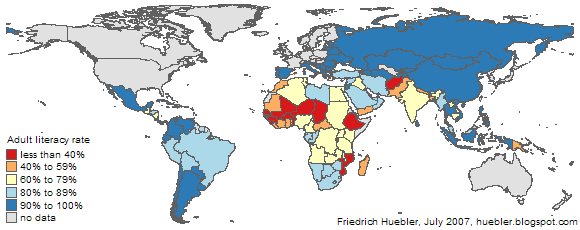Of the world population older than 15 years 86 are literate in many countries more than 95 have basic literacy skills

Global Literacy: The Power of Knowledge

In today’s world, knowledge is power. The ability to read and write is not only a fundamental skill but also a gateway to personal and societal development. According to data from Our World in Data, an impressive 86% of the world population older than 15 years are literate. Moreover, in many countries, more than 95% of individuals possess basic literacy skills.
A literate population is crucial for the progress of any nation. It empowers individuals to access and comprehend information, opening doors to educational opportunities and better career prospects. Moreover, literacy plays a significant role in promoting good health, reducing poverty, and fostering gender equality.
High literacy rates are indicative of a well-functioning education system. Countries that prioritize education and invest in quality schooling tend to reap the benefits of a literate population. Accessible and inclusive education policies enhance literacy rates and contribute to overall development.

In recent years, the global literacy rate has shown significant improvement. With advancements in technology and increased access to education, more people than ever have the opportunity to learn and acquire essential literacy skills. Efforts by governments, non-profit organizations, and various international bodies have played a crucial role in driving this positive change.
However, it is essential to acknowledge that disparities in literacy rates persist across regions and communities. Developing countries, particularly those with high poverty rates, face significant challenges in achieving universal literacy. Limited access to quality education, cultural barriers, and social inequities contribute to these disparities.
To bridge the gaps in literacy, it is crucial to prioritize educational reforms, promote inclusive policies, and provide resources to underprivileged communities. By addressing these challenges, societies can continue to strive towards global literacy for all.
In conclusion, global literacy rates have reached impressive levels, with 86% of the world population older than 15 years possessing the ability to read and write. Many countries have achieved even higher literacy rates, with more than 95% of their populations having basic literacy skills. However, it is vital to address the remaining disparities and ensure access to education and literacy for all individuals worldwide.
Source: Our World in Data - Literacy
Tags
Share
Related Posts
Quick Links
Legal Stuff

